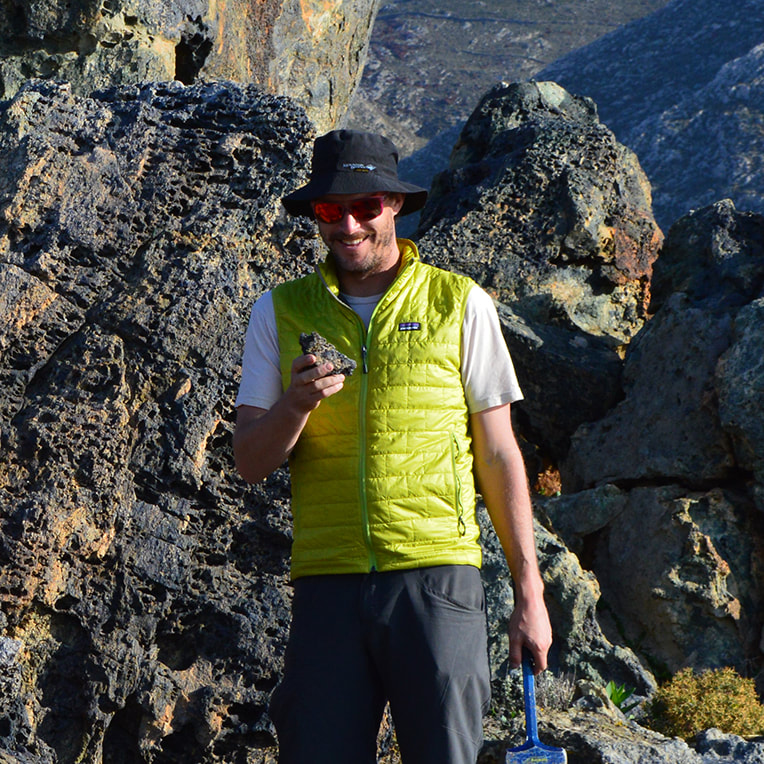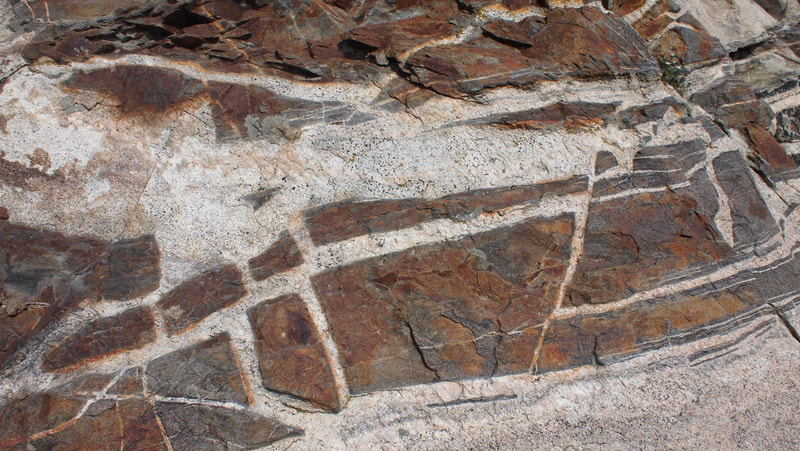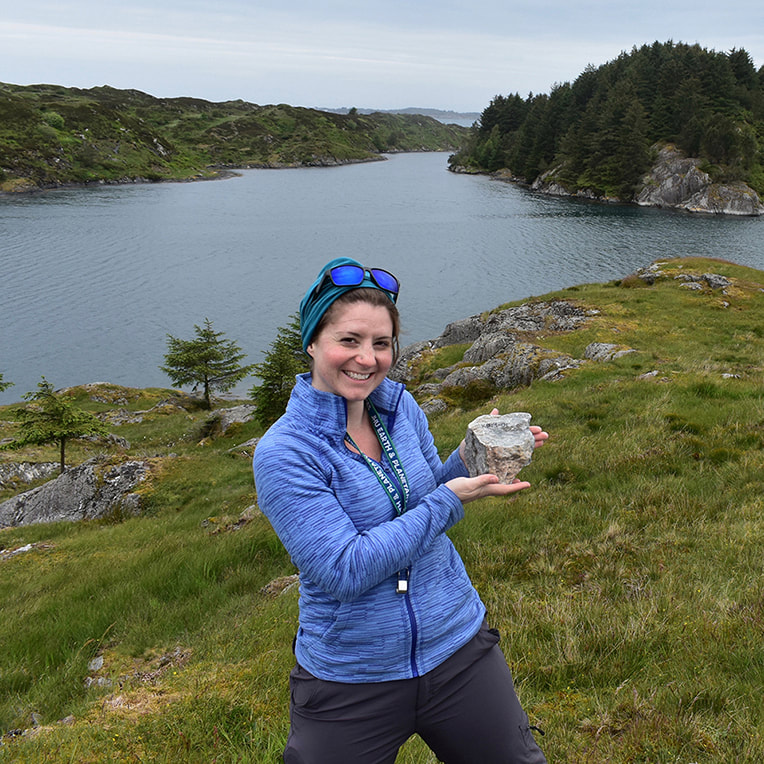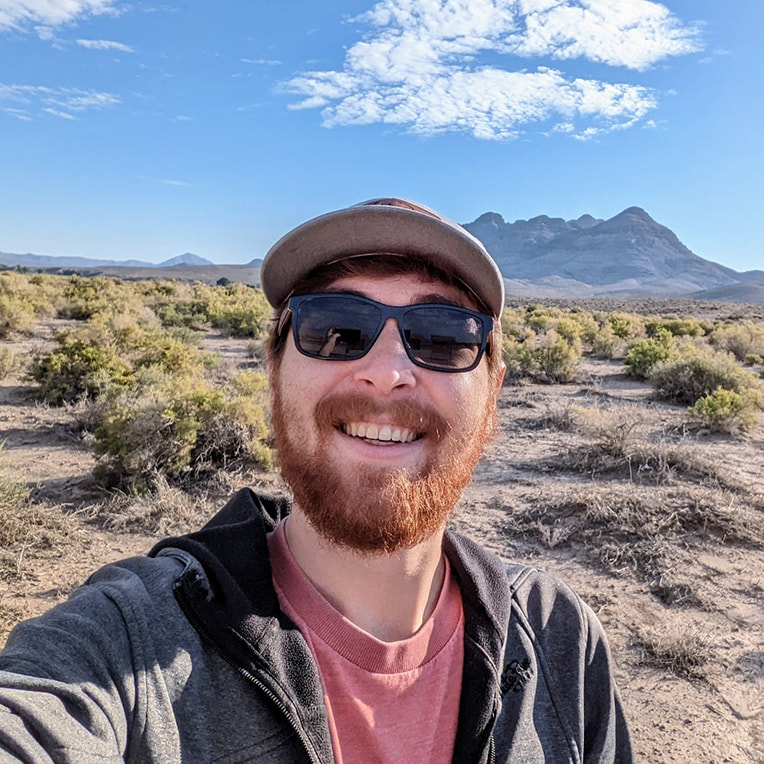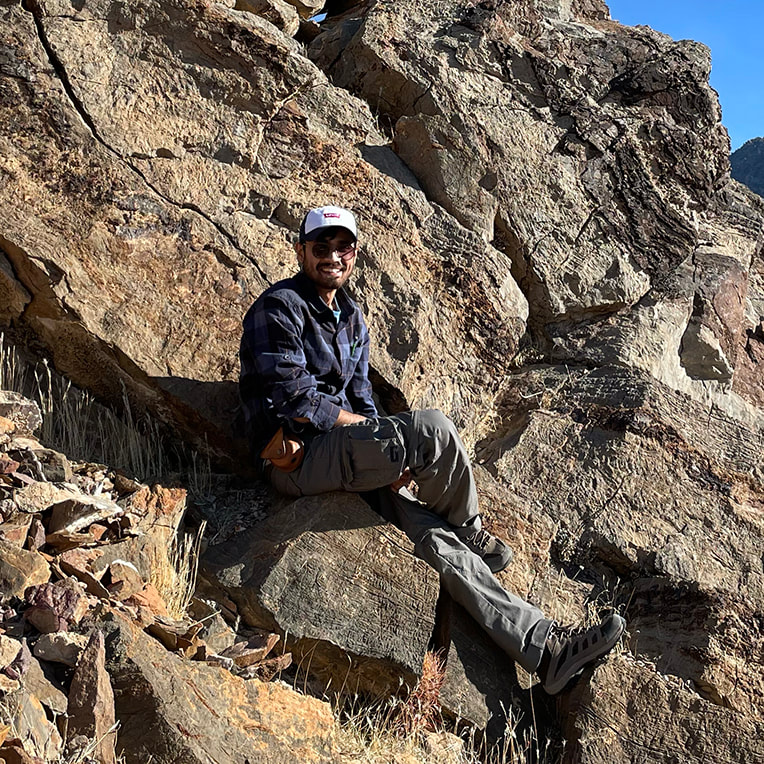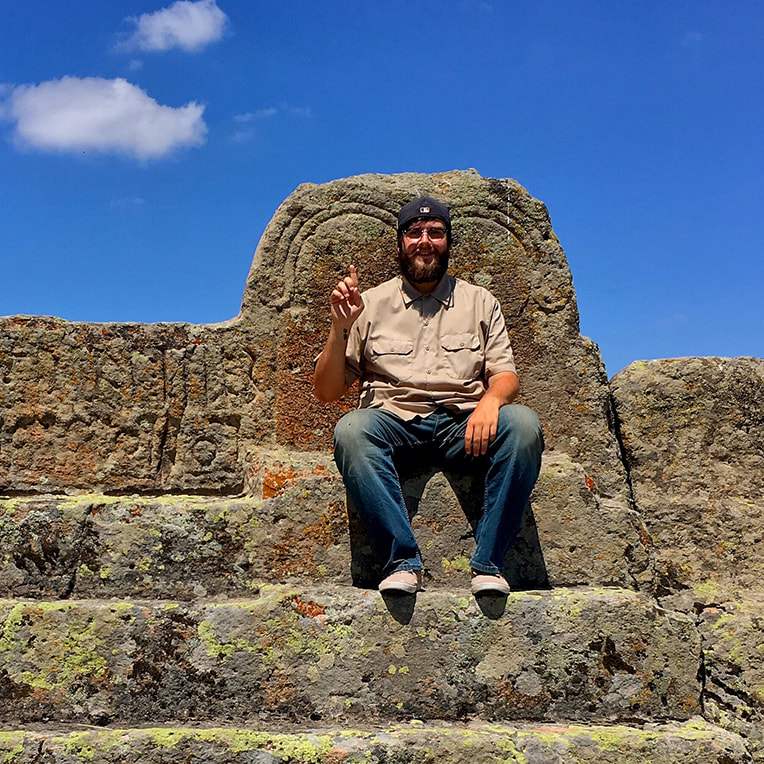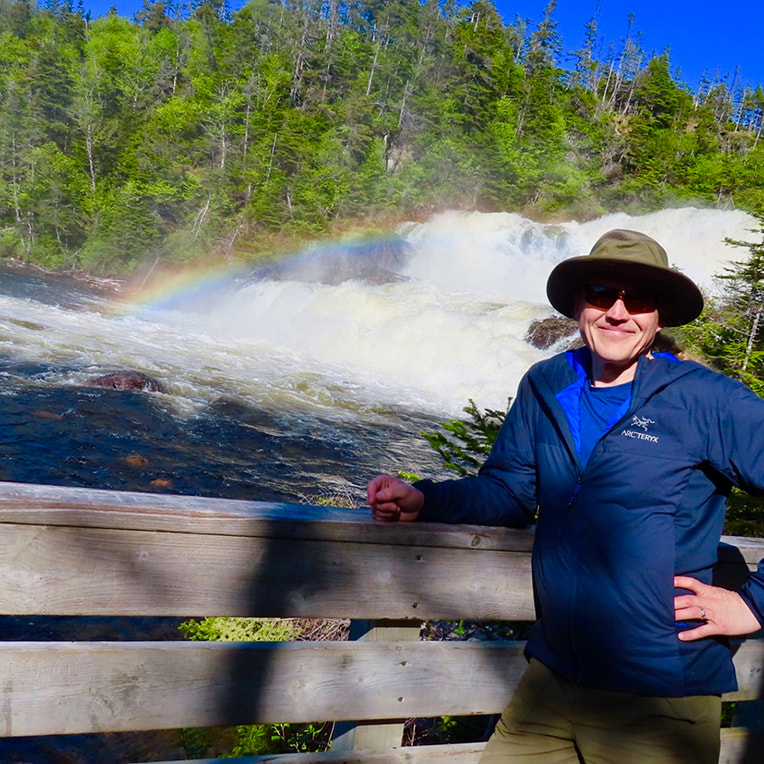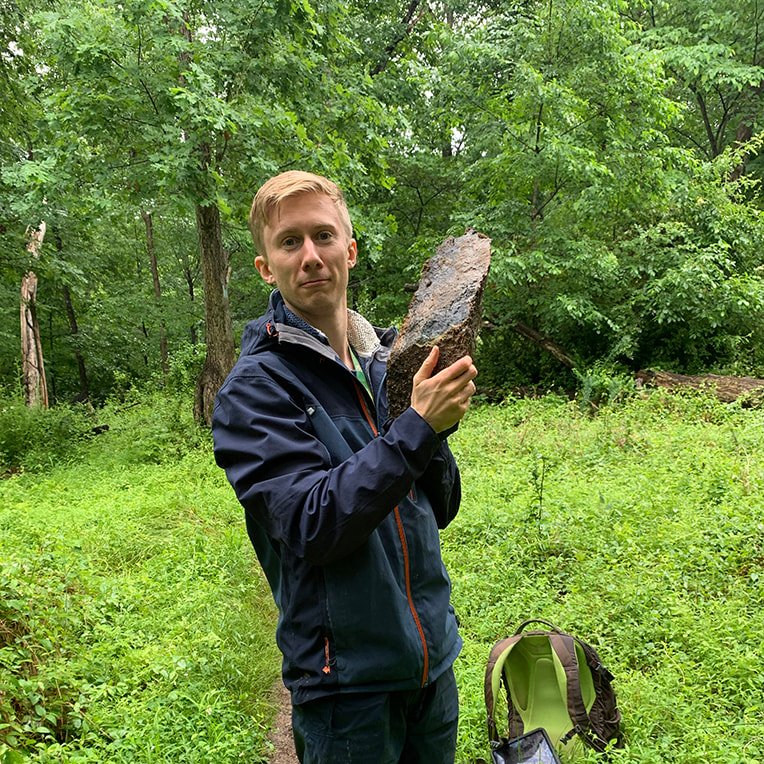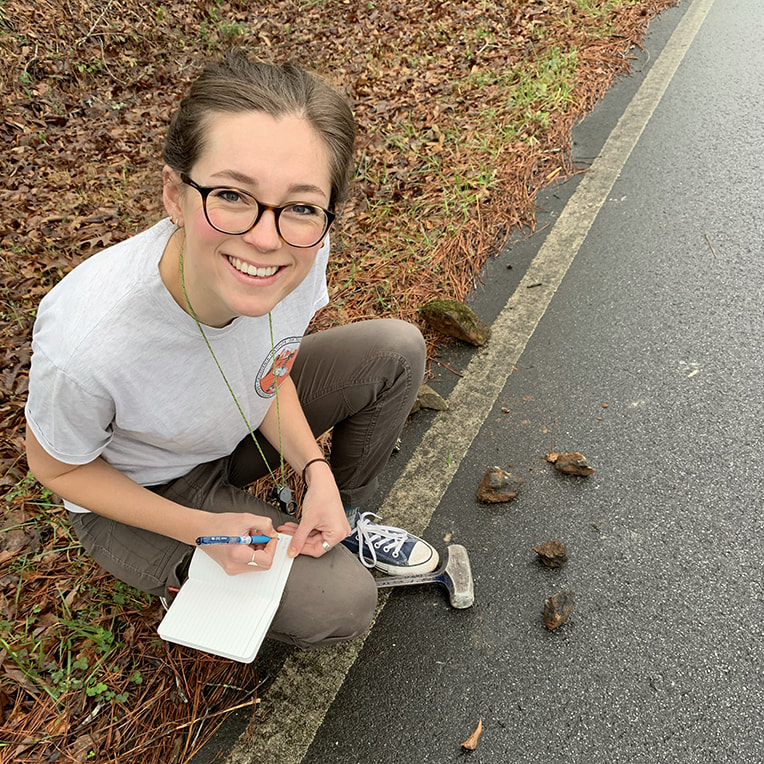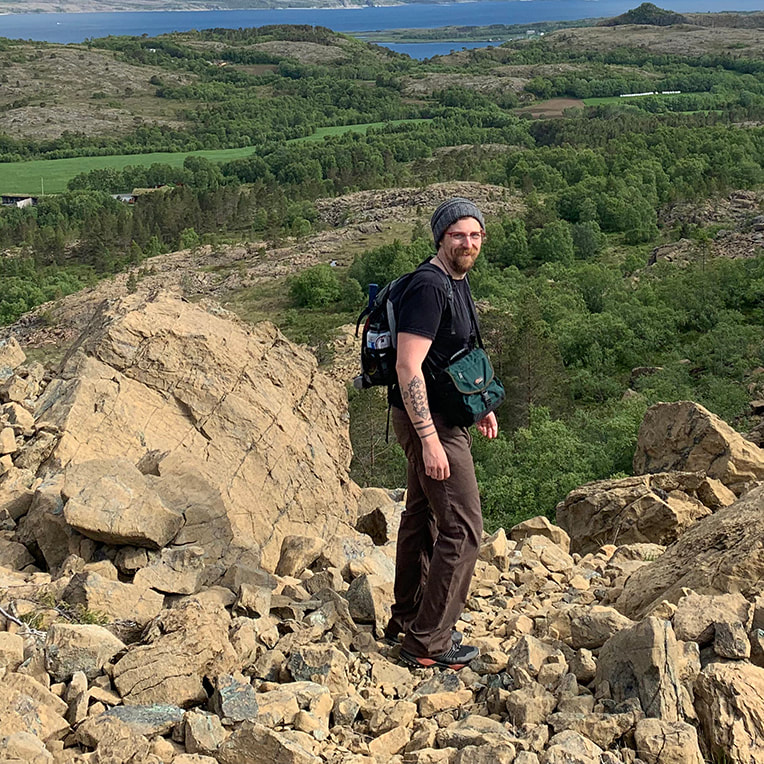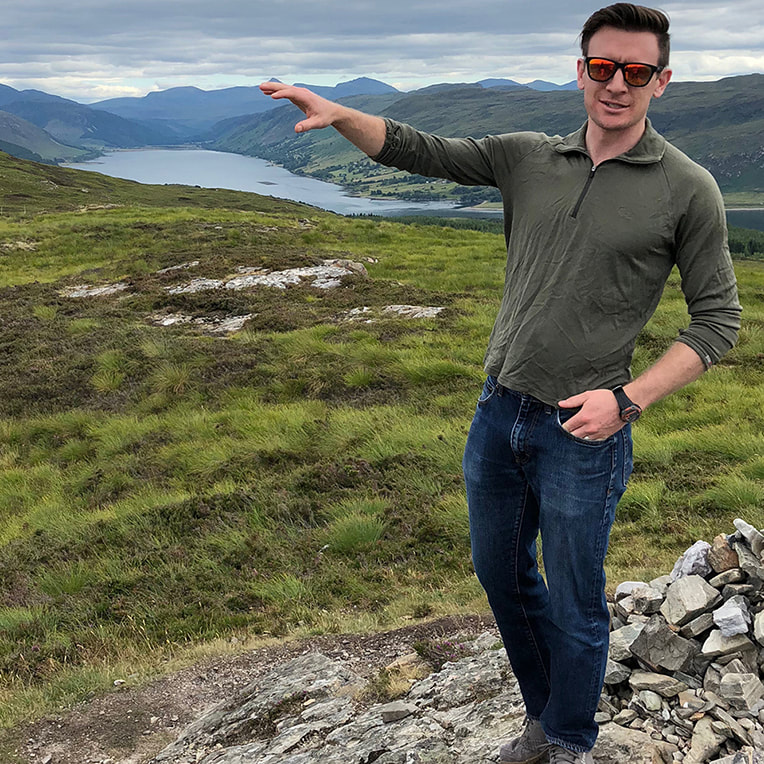Current TeMPO Lab members
Daniel R. Viete -- Assistant Professor
Daniel received his PhD from the Australian National University. He was a Fulbright Visiting Scholar at the University of California, Santa Barbara and then Marie Curie (COFUND) Junior Research Fellow at Durham University before joining the faculty at Johns Hopkins University in July 2016. Daniel is motivated by questions in tectonics, particularly the time scale, rates, tempos and drivers of convergent margin processes. He uses fieldwork, petrology, geochronology and geochemistry. He works on along the entire Appalachian–Caledonian system, the Penokean and Trans Hudson Orogenies, and on subduction zone complexes, globally (the Franciscan of California, Cyclades of Greece, Cordillera de la Costa of Venezuela, etc.).
Dana C. Brenner -- Laboratory Manager
Dana earned her PhD from Johns Hopkins University (working in the TeMPO Lab) in 2018. Her final project focused on metamorphic geology, exploring the clumped-isotope signature of the the Alta Stock thermal aureole (and isograd sequence) in Utah. Dana is now Laboratory Manager for the Mass Spectrometry Cluster (including the LA-ICP-MS in the TeMPO Lab) in the Department of Earth & Planetary Sciences, Johns Hopkins University. Her research interests include the application of isotope geochemistry to questions in metamorphic, sedimentary and tectonic processes. She is currently leading a project on time scales of Grampian thermal activity in Scotland.
Naomi A. Becker -- Graduate Student
Naomi started as a PhD student at Hopkins in August 2018 after finishing her undergraduate studies at the University of North Carolina, Chapel Hill. Naomi’s graduate research concerns records of subduction initiation in the Iapetus Ocean, focusing on ophiolite complexes spanning Alabama to central Norway. She is also interested in the petrogenesis of plagiogranites and their utility in dating tectonomagmatic processes. Naomi’s PhD fieldwork focus is on mafic–ultramafic complexes in Alabama–Georgia, Virginia–Maryland, Newfoundland and Norway. Naomi is currently also a Pathways Intern with the USGS.
Adam Brudner -- Graduate Student
Adam received both a BS and MS from the University of Toronto and will start in the PhD program at JHU in August 2023. Adam's MS research used geochemical proxies in igneous rocks and detrital zircon grains to assess lithospheric thickness during the Grenville Orogeny, yielding a first-author paper in Geology. His PhD work will use fieldwork, whole-rock geochemistry and zircon geochronology to investigate the role of rift inheritance in subduction initiation processes, comparing Phanerozoic and Paleoproterozoic records. His field targets will include multiple ophiolite complexes (and spatially-associated rift packages) along the Phanerozoic Appalachian–Caledonian system in addition to Paleoproterozoic ophiolite complexes of Laurussia and/or Gondawana.
Supratik Roy -- Graduate Student
Supratik started as a PhD student at Hopkins in August 2021 after graduating from the University of Calcutta (BS) and the Indian Institute of Technology, Dhanbad (MS). He is working on heat sources for orogenic metamorphism during the early Paleoproterozoic Penokean Orogeny, and implications for secular change in Earth tectonics. Supratik is interested in integrating observations from structural geology, metamorphic petrology and geochronology to better understand tectonic processes. His previous fieldwork has included mapping in Rajasthan, India and the Democratic Republic of the Congo, and his PhD work has included work on the Penokean Orogeny in the Lake Superior area and Trans Hudson Orogeny in Manitoba, Canada. He has plans for fieldwork in the Zanskar Himalaya in 2024.
John Lafe Shannon -- Graduate Student
John is a PhD scholar in the Interdisciplinary Humanistic Studies (IHS) program at Hopkins, which unites scholars working across departments at JHU. John academic journey has included a BA from St Xavier College, MA from the University of Chicago and then two years in the PhD program in Near Eastern Studies at JHU before entering the IHS program (bridging the PhD programs in Near Eastern Studies and Earth & Planetary Sciences) in 2022. John's research is on the archeology of Mesopotamia and the Arabian Peninsula, focusing on the archeological occurrence and trade of soft stone artifacts. With the TeMPO Lab John is using petroogy and geochemistry to 'fingerprint' chloritite artifacts, as needed to connect artifacts to their specific natural (quarry). Through this sourcing work, John aims to reconstruct Bronze and Iron Age trading pathways, furthering understanding of civilization during its earliest stages.
Jerry L. Burgess -- Research Affiliate at Johns Hopkins University
Jerry is an Associate Teaching Professor in Department of Earth & Planetary Sciences and Director of the Environmental Studies Program at JHU. For his PhD work, Jerry studied the ecology of serpentine soils associated with ophiolite complexes of the Mid Atlantic. Prior to that, he completed his MS research at the University of Maryland, focusing on metamorphic history of rocks from SW Newfoundland. Jerry's current research interests in the TeMPO Lab center around petrogenesis of igneous and metamorphic rocks and the growth and evolution of the Appalachians. Jerry's fieldwork includes work in Newfoundland and the Maryland Piedmont.
George L. Guice -- Research Affiliate at Towson University (Baltimore)
George did his PhD at Cardiff University, before moving to a Peter Buck Postdoctoral Fellowship at the Smithsonian Institution, a Postdoctoral Researcher position in the TeMPO Lab, JHU (2022) then a Kalbfleisch Postdoctoral Fellowship at the American Museum of Natural History. From August 2023, he will be located up the road from the TeMPO Lab, working as an Assistant Professor in the Department of Physics, Astronomy and Geosciences, Towson University. George's research focuses on mafic–ultramafic rocks throughout Earth history, developing geochemical tools to aid assessment of petrogenesis and evolution in plate tectonics (regimes and products). Since moving to the Mid Atlantic, George's work has focused on the tectonic origin of mafic–ultramafic complexes in the Baltimore area and along the Appalachians, in addition to Precambrian mafic–ultramafic complexes in other parts of the world.
Daniel received his PhD from the Australian National University. He was a Fulbright Visiting Scholar at the University of California, Santa Barbara and then Marie Curie (COFUND) Junior Research Fellow at Durham University before joining the faculty at Johns Hopkins University in July 2016. Daniel is motivated by questions in tectonics, particularly the time scale, rates, tempos and drivers of convergent margin processes. He uses fieldwork, petrology, geochronology and geochemistry. He works on along the entire Appalachian–Caledonian system, the Penokean and Trans Hudson Orogenies, and on subduction zone complexes, globally (the Franciscan of California, Cyclades of Greece, Cordillera de la Costa of Venezuela, etc.).
Dana C. Brenner -- Laboratory Manager
Dana earned her PhD from Johns Hopkins University (working in the TeMPO Lab) in 2018. Her final project focused on metamorphic geology, exploring the clumped-isotope signature of the the Alta Stock thermal aureole (and isograd sequence) in Utah. Dana is now Laboratory Manager for the Mass Spectrometry Cluster (including the LA-ICP-MS in the TeMPO Lab) in the Department of Earth & Planetary Sciences, Johns Hopkins University. Her research interests include the application of isotope geochemistry to questions in metamorphic, sedimentary and tectonic processes. She is currently leading a project on time scales of Grampian thermal activity in Scotland.
Naomi A. Becker -- Graduate Student
Naomi started as a PhD student at Hopkins in August 2018 after finishing her undergraduate studies at the University of North Carolina, Chapel Hill. Naomi’s graduate research concerns records of subduction initiation in the Iapetus Ocean, focusing on ophiolite complexes spanning Alabama to central Norway. She is also interested in the petrogenesis of plagiogranites and their utility in dating tectonomagmatic processes. Naomi’s PhD fieldwork focus is on mafic–ultramafic complexes in Alabama–Georgia, Virginia–Maryland, Newfoundland and Norway. Naomi is currently also a Pathways Intern with the USGS.
Adam Brudner -- Graduate Student
Adam received both a BS and MS from the University of Toronto and will start in the PhD program at JHU in August 2023. Adam's MS research used geochemical proxies in igneous rocks and detrital zircon grains to assess lithospheric thickness during the Grenville Orogeny, yielding a first-author paper in Geology. His PhD work will use fieldwork, whole-rock geochemistry and zircon geochronology to investigate the role of rift inheritance in subduction initiation processes, comparing Phanerozoic and Paleoproterozoic records. His field targets will include multiple ophiolite complexes (and spatially-associated rift packages) along the Phanerozoic Appalachian–Caledonian system in addition to Paleoproterozoic ophiolite complexes of Laurussia and/or Gondawana.
Supratik Roy -- Graduate Student
Supratik started as a PhD student at Hopkins in August 2021 after graduating from the University of Calcutta (BS) and the Indian Institute of Technology, Dhanbad (MS). He is working on heat sources for orogenic metamorphism during the early Paleoproterozoic Penokean Orogeny, and implications for secular change in Earth tectonics. Supratik is interested in integrating observations from structural geology, metamorphic petrology and geochronology to better understand tectonic processes. His previous fieldwork has included mapping in Rajasthan, India and the Democratic Republic of the Congo, and his PhD work has included work on the Penokean Orogeny in the Lake Superior area and Trans Hudson Orogeny in Manitoba, Canada. He has plans for fieldwork in the Zanskar Himalaya in 2024.
John Lafe Shannon -- Graduate Student
John is a PhD scholar in the Interdisciplinary Humanistic Studies (IHS) program at Hopkins, which unites scholars working across departments at JHU. John academic journey has included a BA from St Xavier College, MA from the University of Chicago and then two years in the PhD program in Near Eastern Studies at JHU before entering the IHS program (bridging the PhD programs in Near Eastern Studies and Earth & Planetary Sciences) in 2022. John's research is on the archeology of Mesopotamia and the Arabian Peninsula, focusing on the archeological occurrence and trade of soft stone artifacts. With the TeMPO Lab John is using petroogy and geochemistry to 'fingerprint' chloritite artifacts, as needed to connect artifacts to their specific natural (quarry). Through this sourcing work, John aims to reconstruct Bronze and Iron Age trading pathways, furthering understanding of civilization during its earliest stages.
Jerry L. Burgess -- Research Affiliate at Johns Hopkins University
Jerry is an Associate Teaching Professor in Department of Earth & Planetary Sciences and Director of the Environmental Studies Program at JHU. For his PhD work, Jerry studied the ecology of serpentine soils associated with ophiolite complexes of the Mid Atlantic. Prior to that, he completed his MS research at the University of Maryland, focusing on metamorphic history of rocks from SW Newfoundland. Jerry's current research interests in the TeMPO Lab center around petrogenesis of igneous and metamorphic rocks and the growth and evolution of the Appalachians. Jerry's fieldwork includes work in Newfoundland and the Maryland Piedmont.
George L. Guice -- Research Affiliate at Towson University (Baltimore)
George did his PhD at Cardiff University, before moving to a Peter Buck Postdoctoral Fellowship at the Smithsonian Institution, a Postdoctoral Researcher position in the TeMPO Lab, JHU (2022) then a Kalbfleisch Postdoctoral Fellowship at the American Museum of Natural History. From August 2023, he will be located up the road from the TeMPO Lab, working as an Assistant Professor in the Department of Physics, Astronomy and Geosciences, Towson University. George's research focuses on mafic–ultramafic rocks throughout Earth history, developing geochemical tools to aid assessment of petrogenesis and evolution in plate tectonics (regimes and products). Since moving to the Mid Atlantic, George's work has focused on the tectonic origin of mafic–ultramafic complexes in the Baltimore area and along the Appalachians, in addition to Precambrian mafic–ultramafic complexes in other parts of the world.
Former TeMPO Lab Members
Freya R. George -- Former Fulbright Visiting Scholar and Blaustein Postdoctoral Fellow (2019–22)
Freya did her PhD at Carleton University, Canada. She was awarded a UK Fulbright Scholarship to Hopkins 2019–20, and stayed on as a Blaustein Postdoctoral Fellow in the Department of Earth & Planetary Sciences, JHU. In September 2022 Freya moved to a Lecturer position at the University of Bristol. Her research uses microanalytical and modeling techniques to investigate metamorphic drivers, reaction kinetics, and chemical mobility in crystalline rocks. Freya has worked in the Sikkim Himalaya. Her current work considers spectacular metamorphic rocks from the Baltimore area in addition to multiple subduction zones, globally.
Joseph F. Browning-Hanson -- Former Graduate Student (2018–22)
Joseph was a graduate student in the TeMPO Lab, graduating with an MS in 2022. Prior to graduate study at JHU, Joseph received a BS from the University of Maryland, College Park. Joseph worked on the multi-mineral detrital record of Laurentia, focusing on sampling clusters from the Southern Appalachians (TN and VA), Northern Appalachians (NY, VT and Quebec) and Scottish Caledonides. In total, his work considered 15 metasedimentary samples, producing detrital zircon U–Pb and detrital white mica 40Ar/39Ar dates. Joe now works as a Geologist with the USGS.
Robert M. Holder -- Former Postdoctoral Researcher (2018–20)
Robert completed his PhD studies at the University of California, Santa Barbara, then joined the TeMPO Lab as a Postdoctoral Researcher. From the TeMPO Lab he moved to an Assistant Professor position at the University of Michigan, Ann Arbor. Robert is broadly interested in petrology, petrochronology and tectonics, and has worked in Antarctica, Madagascar, Minnesota, Nevada, Norway and the Superior Province (Canada). Robert's research assesses secular change in conditions, time scales, heat sources and drivers for metamorphism, and implications for evolution in Earth tectonics.
Freya did her PhD at Carleton University, Canada. She was awarded a UK Fulbright Scholarship to Hopkins 2019–20, and stayed on as a Blaustein Postdoctoral Fellow in the Department of Earth & Planetary Sciences, JHU. In September 2022 Freya moved to a Lecturer position at the University of Bristol. Her research uses microanalytical and modeling techniques to investigate metamorphic drivers, reaction kinetics, and chemical mobility in crystalline rocks. Freya has worked in the Sikkim Himalaya. Her current work considers spectacular metamorphic rocks from the Baltimore area in addition to multiple subduction zones, globally.
Joseph F. Browning-Hanson -- Former Graduate Student (2018–22)
Joseph was a graduate student in the TeMPO Lab, graduating with an MS in 2022. Prior to graduate study at JHU, Joseph received a BS from the University of Maryland, College Park. Joseph worked on the multi-mineral detrital record of Laurentia, focusing on sampling clusters from the Southern Appalachians (TN and VA), Northern Appalachians (NY, VT and Quebec) and Scottish Caledonides. In total, his work considered 15 metasedimentary samples, producing detrital zircon U–Pb and detrital white mica 40Ar/39Ar dates. Joe now works as a Geologist with the USGS.
Robert M. Holder -- Former Postdoctoral Researcher (2018–20)
Robert completed his PhD studies at the University of California, Santa Barbara, then joined the TeMPO Lab as a Postdoctoral Researcher. From the TeMPO Lab he moved to an Assistant Professor position at the University of Michigan, Ann Arbor. Robert is broadly interested in petrology, petrochronology and tectonics, and has worked in Antarctica, Madagascar, Minnesota, Nevada, Norway and the Superior Province (Canada). Robert's research assesses secular change in conditions, time scales, heat sources and drivers for metamorphism, and implications for evolution in Earth tectonics.
Friends of the TeMPO Lab
Michael R. Ackerson -- Research Geologist at the Smithsonian Institution
Mike is a Research Geologist in the Department of Mineral Sciences, Smithsonian Institution (National Museum of Natural History). His research centers around analytical geochemistry, petrology, and the records of crustal processes and secular secular change encoded in igneous rocks and minerals. Mike is a frequent collaborator on TeMPO Lab projects, providing expertise and guidance on interpreting rock- and mineral-scale records of melting, magmatism and igneous rock petrogenesis.
Wendy R. Nelson -- Associate Professor at the Smithsonian Institution
Wendy is an Associate Professor in the Department of Physics, Astronomy and Geosciences, Towson University. Her research interests are in igneous petrology and geochemistry, with particular focus on radiogenic isotope and PGE geochemistry of igneous rocks, focusing on magmagenesis during continental rift and oceanic convergent settings. Wendy has been an external advisor to TeMPO Lab Graduate Student Naomi Becker throughout her PhD program.
Herbert W. Fournier
Herbert was an Instructor Professor at la Universidad Central de Venezuela before moving to Canada where he earned his PhD from Queen's University. His research has considered tectonothermal histories of rock units of the Venezuelan Caribbean Mountain System, in addition to episodicity in records of crustal fluid flow (and associated heating) in Australia and Norway. He is currently working with the TeMPO Lab on the Cenozoic tectonic history of the southern Caribbean, as recorded in metamorphic rocks of the Cordillera de la Costa, Venezuela.
Rebecca Kavage Adams -- Geologist at the Geological Survey of Maryland
Rebecca is a field geologist at the Geological Survey of Maryland. She is currently leading mapping projects in the Maryland Piedmont and production of the Woodbine 1:24k quadrangle. Rebecca has been working with the TeMPO Lab to obtain igneous and detrital zircon dates for interpretation of the regional geology in the Woodbine area.
William D. Junkin -- former Geologist at the Geological Survey of Maryland (now at Nevada Bureau of Mines and Geology)
Will was a field geologist with the Geological Survey of Maryland. He led the mapping work for the Relay 1:24k quadrangle (2021), working with the TeMPO Lab to obtain igneous dates for volcanic units of the Baltimore Mafic Complex cropping out along the Patapsco River corridor, W and SW of Baltimore.
Mike is a Research Geologist in the Department of Mineral Sciences, Smithsonian Institution (National Museum of Natural History). His research centers around analytical geochemistry, petrology, and the records of crustal processes and secular secular change encoded in igneous rocks and minerals. Mike is a frequent collaborator on TeMPO Lab projects, providing expertise and guidance on interpreting rock- and mineral-scale records of melting, magmatism and igneous rock petrogenesis.
Wendy R. Nelson -- Associate Professor at the Smithsonian Institution
Wendy is an Associate Professor in the Department of Physics, Astronomy and Geosciences, Towson University. Her research interests are in igneous petrology and geochemistry, with particular focus on radiogenic isotope and PGE geochemistry of igneous rocks, focusing on magmagenesis during continental rift and oceanic convergent settings. Wendy has been an external advisor to TeMPO Lab Graduate Student Naomi Becker throughout her PhD program.
Herbert W. Fournier
Herbert was an Instructor Professor at la Universidad Central de Venezuela before moving to Canada where he earned his PhD from Queen's University. His research has considered tectonothermal histories of rock units of the Venezuelan Caribbean Mountain System, in addition to episodicity in records of crustal fluid flow (and associated heating) in Australia and Norway. He is currently working with the TeMPO Lab on the Cenozoic tectonic history of the southern Caribbean, as recorded in metamorphic rocks of the Cordillera de la Costa, Venezuela.
Rebecca Kavage Adams -- Geologist at the Geological Survey of Maryland
Rebecca is a field geologist at the Geological Survey of Maryland. She is currently leading mapping projects in the Maryland Piedmont and production of the Woodbine 1:24k quadrangle. Rebecca has been working with the TeMPO Lab to obtain igneous and detrital zircon dates for interpretation of the regional geology in the Woodbine area.
William D. Junkin -- former Geologist at the Geological Survey of Maryland (now at Nevada Bureau of Mines and Geology)
Will was a field geologist with the Geological Survey of Maryland. He led the mapping work for the Relay 1:24k quadrangle (2021), working with the TeMPO Lab to obtain igneous dates for volcanic units of the Baltimore Mafic Complex cropping out along the Patapsco River corridor, W and SW of Baltimore.
